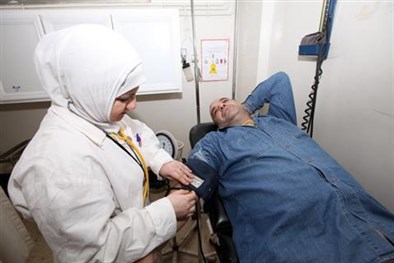Source: http://www.dailystar.com.lb
AZZEH/BEIRUT: “God’s mercy is what is keeping the people healthy.” As he gives a tour of the tiny health center in the village of Azzeh in the Bekaa Valley, Mohammad Kheir Faraj lists all the reasons nurses want to quit their jobs.
They earn low salaries and even lower respect compared to doctors, rare employment opportunities, poor transport infrastructure to take them to hospitals and centers in other towns, harassment at work, a cultural imperative to stay at home, a desire to leave for more lucrative pay in Gulf countries, and virtually nonexistent career advancement.
“How can I smile at the face [of a patient] when I’m thinking about how to provide food for my children?” said Faraj, the director of nursing at Al-Abrar center in the Bekaa Valley village of Azzeh.
There are currently about 6,000 nurses in Lebanon, according to the Order of Nurses, for a population of more than 4 million, which is further stretched by the arrival of around a million Syrians fleeing the conflict next door.
A fifth plan to leave to work abroad, and two thirds plan to quit their job here in the next three years.
The exodus poses a health care crisis and worsens a major shortage in the country’s most vulnerable areas, according to the findings of a new study.
Many of the best-qualified nurses are migrating to the Gulf, North America and Europe to escape poor salaries, difficult working hours, workplace violence and low social prestige, in addition to limited prospects for career advancement – a “brain drain” of nurses.
“We definitely have shortage of nurses in addition to maldistribution,” said Fadi al-Jardali, associate professor at AUB and lead author of the study, who has worked with the World Health Organization on issues related to health policy and recruitment and retention of health care workers.
Click here to read the full article.














